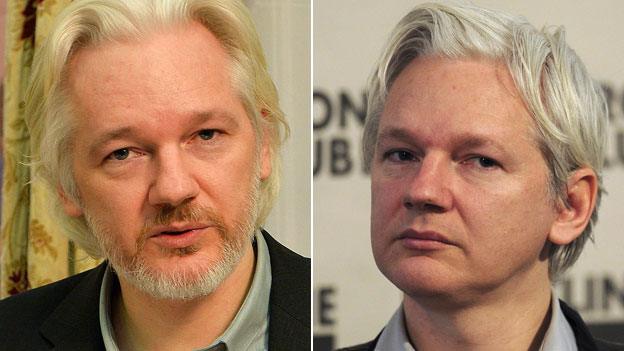Julian Assange speaks of 'leaving' Ecuador embassy
- Published
Julian Assange says he plans to leave the Ecuadorean embassy "soon"
Wikileaks founder Julian Assange has suggested he will be leaving London's Ecuadorean embassy "soon".
He said he understood from Wikileaks spokesman Kristinn Hrafnsson he would be "leaving the embassy" after two years' refuge but gave no more details.
Mr Assange is wanted for questioning over alleged sex assaults in Sweden and faces arrest if he leaves the embassy.
Mr Hrafnsson later said the plan "as always" was for Mr Assange to depart when the UK "calls off the siege".
"The world is not coming to an end," Mr Hrafnsson told reporters inside the embassy.
"The plan, as always, is to leave as soon as the UK government decides to honour its obligations in relation to international agreements."
Mr Assange, 43, faces questioning by prosecutors in Stockholm over claims made by two women in 2010. He denies the allegations and sought refuge in the Ecuadorean embassy in June 2012 shortly after the UK's Supreme Court dismissed his efforts to block his extradition.
Since then police have maintained a round-the-clock presence outside the building, in London's Knightsbridge, at a cost of £6.4m.
Clive Coleman, the BBC's legal correspondent, said that nothing had changed since 2012 and Mr Assange would be arrested and extradited if he left the embassy.
Speaking at the news conference, Mr Assange said: "I understand that Kristinn Hrafnsson has said that he can confirm I am leaving the embassy soon".
But he added it was not because he needed medical treatment, as had been reported in some of the UK press.

'Mixed messages'
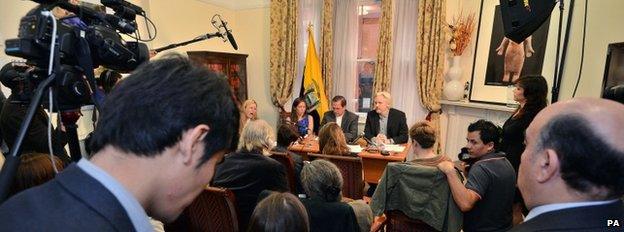
Vanessa Buschschluter, at the Ecuadorean embassy
This was certainly a news conference of mixed messages. Expectations of a news-making announcement were high as a group of a dozen journalists filed into the Ecuadorean embassy.
They were further fuelled by the fact that we were asked to hand over our mobile phones before entering the embassy, something which had not been the case during a similar news conference held in June to mark the second anniversary of Julian Assange first seeking refuge.
Mr Assange used this occasion to dispel "misinformation" and to make the point that he has never been charged with any offence either here or in Sweden.
But challenged by journalists to confirm or deny rumours he would leave the embassy soon, he gave a cryptic answer, quoting Wikileaks spokesman Kristinn Hrafnsson.
Asked by journalists to clarify his answer, he just said: "I think I've said enough".
Ecuadorean Foreign Minister Ricardo Patino on the other hand seemed to suggest Mr Assange would be in the embassy for a long time. He asked how long the Swedish judiciary could allow this situation to continue: "Five more years? Ten more years?" and lamented that there had been "no movement" since Mr Assange entered the embassy in June 2012.

'Bound to fail'
Mr Assange says he fears he could eventually be handed over to the US because Wikileaks published classified US military documents on the Afghan and Iraq wars.
But UK courts have repeatedly ruled that he should be sent to Sweden to face questioning.
The UK first ordered his extradition in February 2011. Mr Assange launched a number of appeals, which culminated in the Supreme Court saying the extradition was lawful in 2012.
After that decision, Mr Assange, who had been on conditional bail, sought refuge in the Ecuadorean embassy.
He was then granted asylum by Ecuador in August 2012 and the country's foreign minister Ricardo Patino said he would continue to be offered "protection".
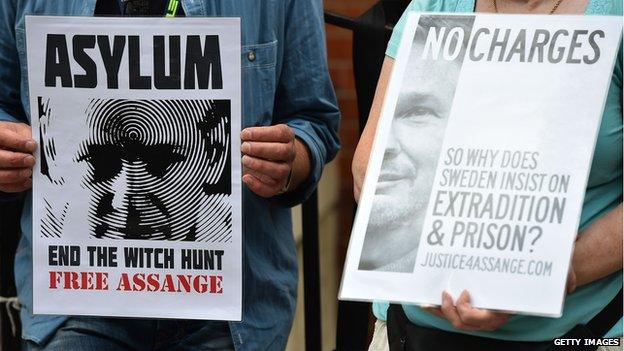
Supporters demonstrated last month after a Swedish court upheld an arrest warrant against the Wikileaks founder
Sitting next to Mr Patino at a news conference on Monday, Mr Assange said his health had suffered during his time inside the embassy.
Reports in UK newspapers at the weekend said Mr Assange had developed a heart defect and a chronic lung condition during his confinement.
The Australian said the reasons for him leaving were not those "reported by the Murdoch press" - but did not elaborate further.
Our correspondent added that any argument Mr Assange could not be extradited because of his health was "almost certainly bound to fail" because Sweden has a good healthcare system.
'Better climate'
Mr Patino said the Ecuadorean government would attempt to meet Foreign Secretary Philip Hammond to discuss the case.
He said changes to the UK's extradition laws had created a better climate for reaching a deal over Mr Assange.
"It is time to free Julian Assange. It is time for his human rights to be finally respected," Mr Patino added.
A UK Foreign Office spokesman called on the Ecuadorean government to help "bring this difficult and costly situation to an end".
"We remain as committed as ever to reaching a diplomatic solution to this situation.
"We are clear that our laws must be followed and Mr Assange should be extradited to Sweden," the spokesman added.
- Published26 June 2024
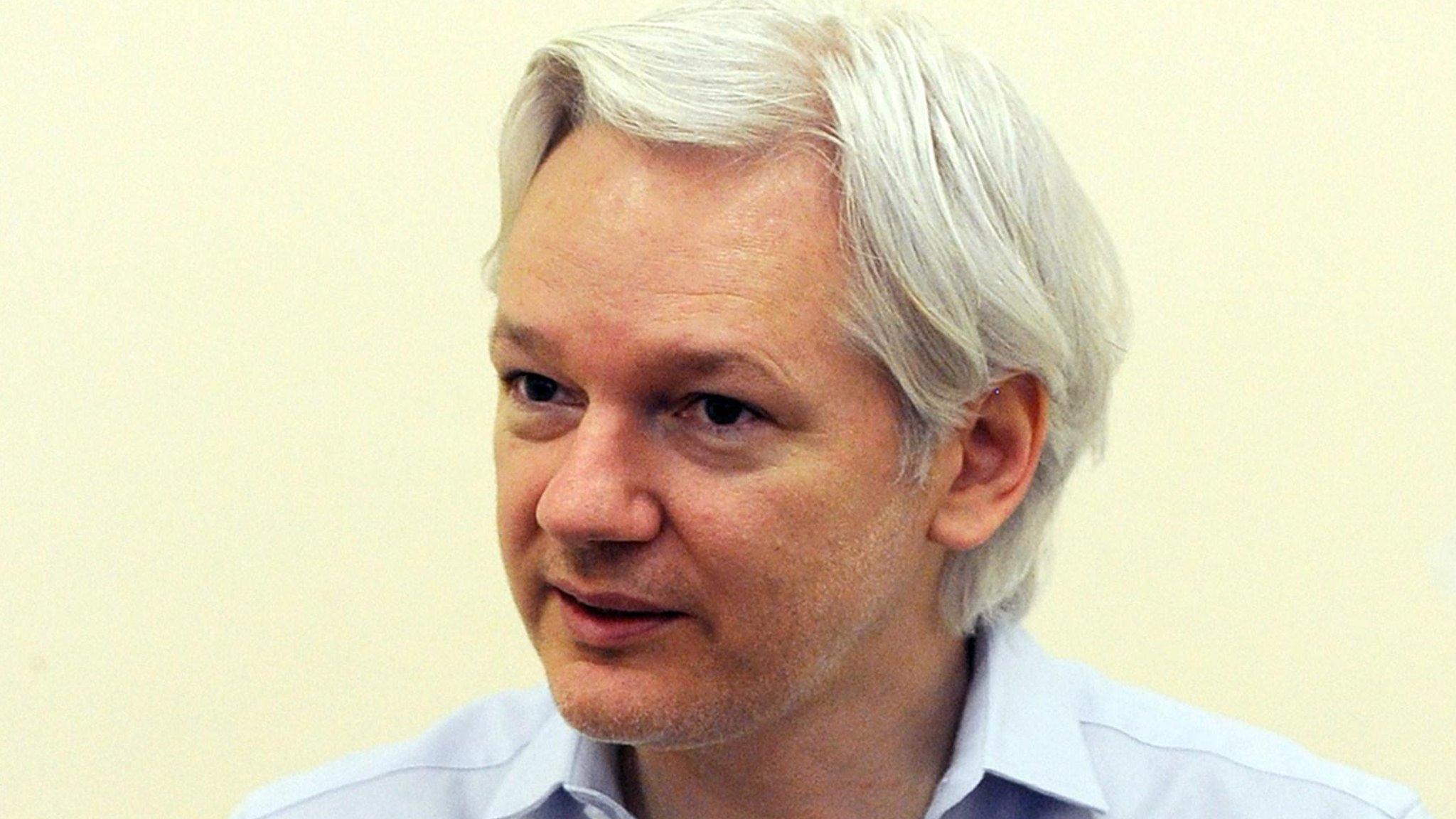
- Published13 March 2015
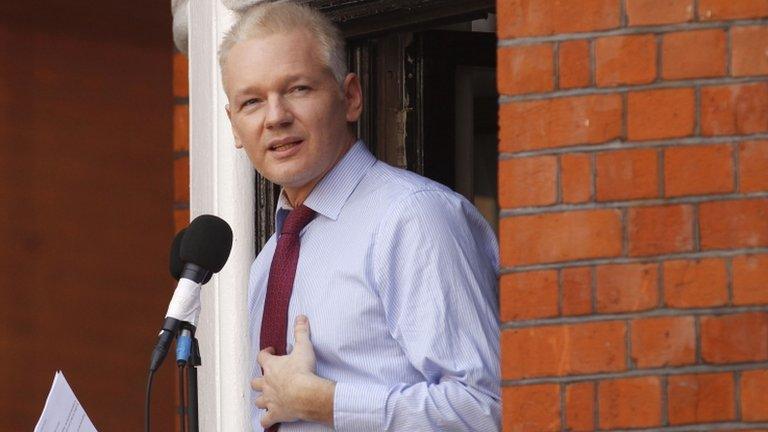
- Published21 August 2014
